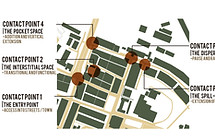ARCHITECTURE DESIGN STUDIO IV
| ARC60206 |

THEORIES IN ARCHITECTURE AND URBANISM
| ARC61303 |
In this module, we looked into theories in architecture, encapturing life in between building, life in the public realm. In the first project, we were given an Asian country street, and further dissect the given street, understanding the street and identifying prominent contact points. We followed by reading a few readers perspective towards architecture and in urbansim, to expand our knowledge with how a city and human interact, and forms life within. We were required to write synopsis about these readers. At last, we written a comparative analysis essay regarding the given asian street, as well as the site chosen for our final design studio project, to identify its similarities and differences between these streets, implementing the theories acknowledged from the readers, grasping a more in-depth understanding of the urban settings.
PROJECT 1:
Case Study
PROJECT 1B
Synopsis
PROJECT 2:
Comparative Analysis Essay
REFLECTION

In this module, it was eye opening to be reading theories about architecture. It expanded my knowledge towards my understanding towards architecture, the relationship between human and cities. These acknowledgement helped me connect with real life settings, connecting the theories with the streets or cities I'm in, and pushes me to think more, to generate ideas to promote life in the public realm. This module was able to made me more sensitive to the surrounding, and being able to not only observe, but also understand about our roles as a human being, as a pedestrian in a city, and how these streets and town were designed for us, to accommodate living patterns, and all in all, the reciprocation between cities and human activities. It was a very interesting module because I felt my senses being heighten, being more sensible to spaces. It made me more connected to any given space, and constantly driven to improve our lives for the betterment, whether in a building or in the public realm.

DISCIPLINE
SPECIFIC KNOWLEDGE


INTRAPERSONAL SKILLS

INTERPERSONAL SKILLS

COMMUNICATION SKILLS

DIGITAL LITERACY

LIFELONG LEARNING
THINKING AND PROBLEM SOLVING SKILLS


